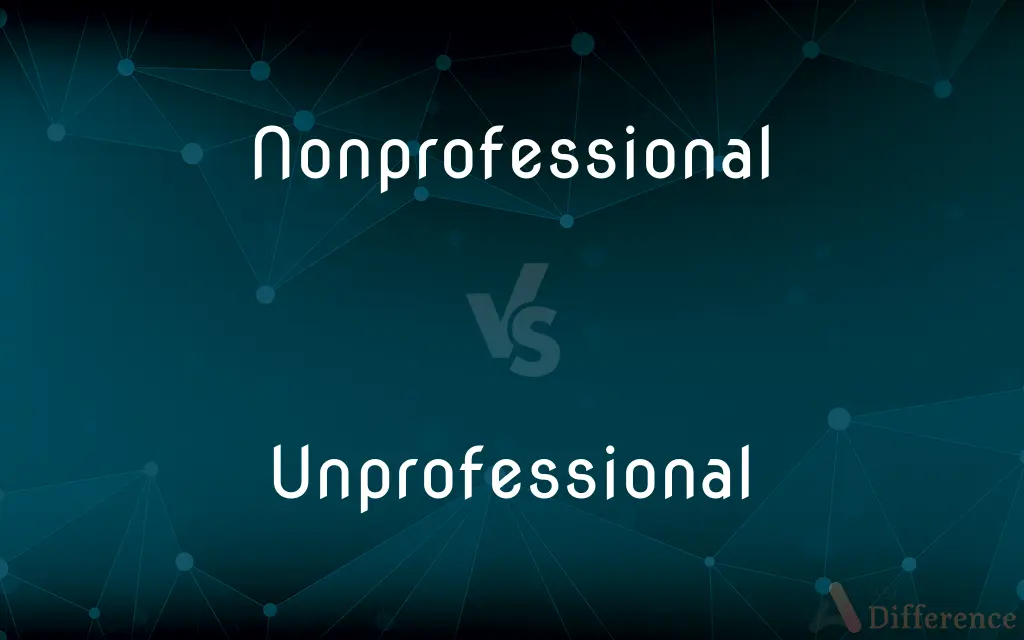Nonprofessional vs. Unprofessional — What's the Difference?
By Fiza Rafique & Maham Liaqat — Updated on April 3, 2024
Nonprofessional refers to someone not engaged in a profession or lacking professional qualifications, while unprofessional describes behavior not meeting the standards expected in a professional setting.

Difference Between Nonprofessional and Unprofessional
Table of Contents
ADVERTISEMENT
Key Differences
Nonprofessional and unprofessional are terms that, despite sounding similar, carry distinct meanings. Nonprofessional is used to describe individuals who are not engaged in a specific profession or lack professional qualifications. This term does not carry a negative connotation; it simply indicates that the person does not perform a task as their profession or is not considered a professional in a certain field. For example, a nonprofessional investor might invest in stocks without it being their full-time occupation or without having formal training in finance. On the other hand, unprofessional describes behavior or actions that fall below the standards expected in a professional setting. This term is inherently negative, suggesting a breach of ethical standards, incompetence, or conduct that is inappropriate for someone in a professional role. Examples of unprofessional behavior include being consistently late to work, disrespecting colleagues, or failing to adhere to industry standards and ethics.
While being nonprofessional is about the status or level of formal engagement in a profession, being unprofessional refers specifically to the quality of one's actions within a professional context. The distinction is crucial in understanding the implications of each term. A nonprofessional may still exhibit a high degree of competence and ethical behavior in their activities, whereas an unprofessional individual demonstrates a lack of respect for professional norms and responsibilities.
In practice, nonprofessionals often contribute significantly to their areas of interest or activity, bringing fresh perspectives or amateur enthusiasm that can complement professional expertise. Conversely, unprofessional behavior can undermine trust and efficiency within professional environments, affecting team dynamics, client relationships, and the individual's career prospects.
The difference between nonprofessional and unprofessional highlights the importance of context in evaluating an individual's role and behavior. Recognizing this distinction helps in accurately assessing situations in the workplace and beyond, ensuring that judgments and criticisms are both fair and constructive.
Comparison Chart
Definition
Not engaged in a profession or lacking professional qualifications.
Behavior that falls below the standards of professionalism.
ADVERTISEMENT
Connotation
Neutral, indicating absence of professional status or activity.
Negative, indicating inappropriate or unethical behavior.
Context
Relates to one's status or qualification in a professional field.
Concerns the quality of behavior within a professional setting.
Examples
An amateur athlete, a hobbyist painter.
Disrespecting colleagues, neglecting duties.
Impact
May or may not impact professional settings, often depends on context.
Generally has a negative impact on workplace environment and professional reputation.
Compare with Definitions
Nonprofessional
Engaging as an amateur.
As a nonprofessional photographer, she captures stunning images.
Unprofessional
Inappropriate for a professional setting.
Unprofessional attire can negatively impact client perceptions.
Nonprofessional
Not belonging to or engaged in a profession.
Nonprofessional volunteers contributed extensively to the project.
Unprofessional
Below professional standards.
Arriving late consistently is considered unprofessional.
Nonprofessional
Lacking professional qualifications.
The seminar is open to both professionals and nonprofessionals interested in coding.
Unprofessional
Ethically or morally questionable.
Sharing confidential information is unprofessional and risky.
Nonprofessional
Outside one’s professional role.
He offers nonprofessional advice based on personal experience.
Unprofessional
Damaging to professional reputation.
Unprofessional conduct can lead to disciplinary actions.
Nonprofessional
Hobbyist or enthusiast.
Nonprofessional investors play a significant role in the stock market.
Unprofessional
Lacking professionalism in behavior.
Her unprofessional comments were not appreciated during the meeting.
Nonprofessional
One who is not a professional.
Unprofessional
Below or contrary to the standards expected in a particular profession
A report on unprofessional conduct
Nonprofessional
Not professional; amateur
Unprofessional
Not in a profession.
Nonprofessional
One who is not a professional; an amateur.
Unprofessional
Not a qualified member of a professional group.
Nonprofessional
Not belonging to a profession.
Unprofessional
Not conforming to the standards of a profession
Unprofessional behavior.
Nonprofessional
Not done by, or proceeding from, professional men; contrary to professional usage; unprofessional.
Unprofessional
Characteristic of an amateur; inexpert.
Nonprofessional
Not professional; not engaged in a profession or engaging in as a profession or for gain;
The nonprofessional wives of his male colleagues
Nonprofessional actors
Unprofessional
Unbecoming of a professional; hence inappropriate in the workplace
Unprofessional behavior
Unprofessional
Lacking a profession.
Unprofessional
One who is not a professional.
Unprofessional
Not characteristic of or befitting a profession or one engaged in a profession;
Described in unprofessional language so that high school students could understand it
Was censured for unprofessional conduct
Unprofessional repairs
Common Curiosities
Is it possible for a professional to act unprofessionally?
Yes, even individuals with professional qualifications can exhibit unprofessional behavior, highlighting the distinction is based on conduct rather than status.
What is considered unprofessional behavior?
Unprofessional behavior includes actions and conduct that violate the norms, ethics, and standards expected in a professional setting.
What does it mean to be nonprofessional?
Being nonprofessional means not being formally engaged in a profession or lacking the qualifications typically associated with being a professional in a field.
Can nonprofessional work be valuable?
Yes, nonprofessional work can be highly valuable, offering fresh insights, enthusiasm, and contributions that complement professional expertise.
How can unprofessional behavior affect a workplace?
It can undermine trust, disrupt team dynamics, damage relationships with clients or customers, and negatively impact an individual's career.
How should unprofessional behavior be addressed?
It should be addressed through clear communication, setting expectations, and, if necessary, disciplinary actions to maintain professional standards.
Are there standards defining professional and unprofessional behavior?
Yes, most professions have codes of ethics and conduct that outline expected behaviors and standards, distinguishing professional from unprofessional actions.
Can a nonprofessional become a professional?
With the necessary education, training, and qualifications, a nonprofessional can transition to a professional status in their field of interest.
Can someone be a professional in one field and nonprofessional in another?
Absolutely, being professional or nonprofessional is context-specific, depending on the individual's qualifications and engagement in a particular field.
Does being nonprofessional imply a lack of skill or knowledge?
Not necessarily; nonprofessionals can be highly skilled or knowledgeable in their areas of interest, though they may not meet formal professional criteria.
Share Your Discovery

Previous Comparison
Cast vs. Mold
Next Comparison
Mammoth vs. MastodonAuthor Spotlight
Written by
Fiza RafiqueFiza Rafique is a skilled content writer at AskDifference.com, where she meticulously refines and enhances written pieces. Drawing from her vast editorial expertise, Fiza ensures clarity, accuracy, and precision in every article. Passionate about language, she continually seeks to elevate the quality of content for readers worldwide.
Co-written by
Maham Liaqat













































